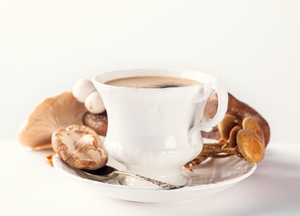You’ve probably heard the buzz: sip mushroom coffee to sharpen focus, boost immunity, and get a clean energy lift without the midday crash. But is it real, or mostly hype?
The truth is not all mushroom coffee is created equal, but when you find one that’s high quality and made with the right method and dosage, the benefits are legit. In this post we’ll break down what benefits are backed by research, what claims matter most, and how to spot a high‑quality mushroom coffee that’s actually worth your time and money
What is mushroom coffee?

Despite the name, it’s not just a mug of mushroom soup in disguise.
Mushroom coffee is coffee that’s been blended or infused with functional mushrooms. These natural compounds have been used in traditional medicine for centuries to support brain health, immunity, and energy.
While it might seem like a wellness trend, it actually goes way back. During World War II, people in Finland started brewing chaga mushrooms as a coffee alternative when beans were hard to find. These days, it’s less about replacing caffeine and more about enhancing it with ingredients that offer deeper, more sustained benefits. And when you find the right blend you won’t even taste the mushrooms.
What the science says about mushroom coffee
Unlike caffeine, functional mushrooms don’t give you a quick jolt. Instead, they support the body over time by working with systems like energy metabolism, immune response, and cognitive function.
Here’s what the research says about the key mushrooms you’ll find in a quality blend:

-
Lion’s mane: This shaggy-looking mushroom helps stimulate Nerve Growth Factor (NGF), which supports brain cell repair and regeneration. In clinical studies, older adults taking lion’s mane daily for 12–16 weeks showed noticeable improvements in memory and focus.
-
Chaga: Chaga is packed with beta-glucans and polyphenols, which help protect against oxidative stress and support the immune system. It’s often used for antioxidant support and to help the immune system stay balanced.
-
Cordyceps: Cordyceps helps the body use oxygen more efficiently and supports the production of ATP (the energy currency of your cells). One study showed improvements in stamina within a few weeks of daily use making it a favorite among athletes and anyone chasing clean energy.
Is mushroom coffee better for you?
It can be—but only if it’s made well. Mushroom coffee isn’t automatically better than regular coffee, but the right blend can offer more targeted support for things like stress resilience, recovery, and focus.
Regular coffee already comes with perks (like antioxidants and better focus). But mushroom coffee can further boost your morning routine by adding compounds that support long-term mental and physical health without changing the taste. We like to think of it as coffee with benefits. Same delicious brew, but with extra brain and body support packed in.
What to watch out for
Unfortunately, not all mushroom coffees deliver on their promises and are little more than clever marketing. Here’s what to watch out for if you want real measurable benefits:

-
Low-quality ingredients: Some blends use mycelium grown on grain — cheaper to produce, but much lower in active compounds than the actual mushroom (aka the fruiting body).
-
Tiny doses: If your cup contains less than 250–500 mg of mushroom extract, the benefits are likely too small to notice.
-
Unclear labeling: If the package doesn’t say how much of each mushroom is used, what part of the mushroom it comes from, or how it was extracted, there’s no way to tell what you’re actually getting.
-
Expecting a quick fix: Functional mushrooms don’t work like stimulants. They need time (usually 2 to 4 weeks or more of consistent use) to start showing benefits.
What to look for in a quality mushroom coffee
Here’s what to look for when you want a blend that actually supports your body:

-
Fruiting body only: Most of the active compounds, like beta-glucans and triterpenes, are found in the fruiting body, not the mycelium. Look for brands that clearly state they use 100% fruiting body. This is arguably the most important factor in mushroom quality.
-
Dual extraction: A dual extraction process uses both water and alcohol to pull out the full range of beneficial compounds like polysaccharides and terpenoids. Without this, you may only be getting part of the benefit.
-
Effective dosage (250–500 mg extract per serving): Research-backed benefits typically require at least 250–500 mg of mushroom extract per cup. If the labels says “proprietary blend” or doesn’t list dosage you’re likely not getting enough of the good stuff.
-
Transparent sourcing: Mushrooms grown in the U.S. or in certified organic systems tend to have stricter quality control and better transparency. While international mushrooms aren’t necessarily harmful, you’ll want to make sure sourcing and testing standards are clear.
-
Infused whole bean format: While not essential, an infused whole bean format (vs. powder mixed in) ensures better consistency, potency, and flavor. It also avoids the common gritty texture of powdered blends.
Is mushroom coffee worth drinking daily?

Absolutely — if you drink a quality blend that maximizes the benefits of the functional mushrooms. For anyone already drinking coffee, switching to a well-formulated mushroom blend can add brain support, immune resilience, and energetic lift all in one cup.
Think of it as wellness meets ritual: a coffee that does more without compromising taste or routine.
Ready to try it for yourself? Try Peak State Brain Sustain Light Roast to experience the benefits of lion’s mane and cordyceps in every sip.

